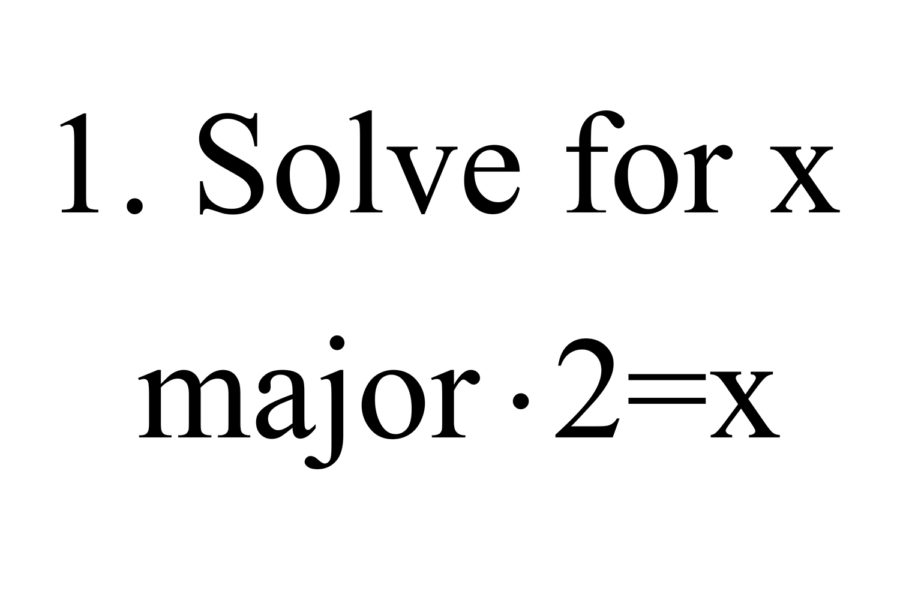Opinion | A double major isn’t always the right choice
June 28, 2019
Upon entering college, students are faced with a plethora of decisions to make. Where should they live? Should they join Greek life? How often should they be calling their parents? What clubs and activities should they invest in?
But the most important decision is one students typically cannot make until their sophomore year — which degrees are they studying for anyway? There are dozens of majors, minors and certificates to mash together into an academic plan, and the pressure surrounding this decision is immense.
More so now than ever, students are choosing double majoring to seem competitive post-graduation — with around 75% picking up two different majors in completely unrelated fields. As a double major myself, I cannot deny the allure of earning two degrees during the typical four-year college timespan. But I’ve found there are some drawbacks to taking on multiple degrees or certificates that are not discussed as much as the benefits.
While earning multiple degrees sounds fancy on paper, it might not always be practical. Earning a bachelor’s degree is hard — earning two is exhausting. To earn two or more degrees in the same time most people take to earn one requires far more time and effort put towards studying. And stretching your workload between two areas of study may mean getting less experience in each.
The time a double major splits between two disciplines is the time that a single major can spend improving themselves in one area of study. With only one major to focus on, students are able to collect more experience in their field via research and training opportunities.
Carl Moses, provost and vice president for academic affairs at Grand View University, is among university officials who worry about the rise of the double majoring student, feeling that students should not view accumulating degrees as the best way to gain experience in college.
“They operate under the assumption employers are impressed by double majors,” he says.
It would be no stretch of the imagination to think that a candidate with two internship experiences in the professional field is likely to have better standing than the candidate with one related internship and one in a completely different work environment.
In addition to undivided focus, committing to only one degree gives students some wiggle room in their academic planning. This is beneficial in case you find yourself failing an important class and have to retake a course. It also allows you to explore classes in different areas that pique their interest. Plenty of people change their minds about what fields they really want to go into after entering college, but it’s tough if you don’t figure that out until the start of your junior year, having put all credits up to that point towards degrees in bioinformatics and professional writing.
Pitt is a huge school with a lot of general education requirements, and it offers a ton of fun, interesting courses each semester for the curious. We even have a “Harry Potter”-focused literature course — but courses like that will be hard to fit in if your schedule is full from the get-go.
If “wasting” time by taking an assortment of classes still worries you, still worried, there are places to make your case for the random classes you took during your time in college. College students can list relevant coursework on resumes when applying for a job and cover letters allow you to go into more detail about certain skills you may have picked up. In an interview, you can direct the conversation to why a certain course about Russian fairy tales, observational astronomy or public speaking lent you skills not a lot of other people in your field have — all without having to commit to an unrelated 33-credit major.
Granted, there are situations where double majoring is the right decision. No one can deny a student who has a genuine passion to cultivate knowledge in two different fields. People are going to find it odd when I have to tell them that I have a Bachelor’s of Science degree in psychology and a Bachelor’s of Arts in English writing, but I couldn’t stop my curiosity in both disciplines. And certain majors complement each other, making it easier to take on both for a double degree.
In an email correspondence, Taylor Thornton explained her decision to double major. She is a rising senior who is double majoring in political science and history because she wanted to take so many courses in both fields.
“What I like most between my two majors is that I can easily intertwine them with the classes I take between the two,” Thornton wrote. “My focus/concentration for my history degree is American history and in those classes I get the historical context and consequences of certain events and time periods. On the political science side I get to specifically examine the political motivations and behaviors of those same historical actors.”
Obviously, the double major works better for some students than others. The point is, consider all of your options and resist the pressure to take on more degrees to seem more competitive to future employers or graduate schools. A university education is meant to prepare you for your future career, but it is also a time when monumental change occurs in how you think and what you desire. Think carefully about what it is that you want, but be open to what could possibly be.
Editor’s note: A previous version of this story referred to Carl Moses as the current provost of Susquehanna University. The column has been updated to correctly reflect that Moses is currently provost and vice president for academic affairs at Grand View University. The Pitt News regrets this error.



